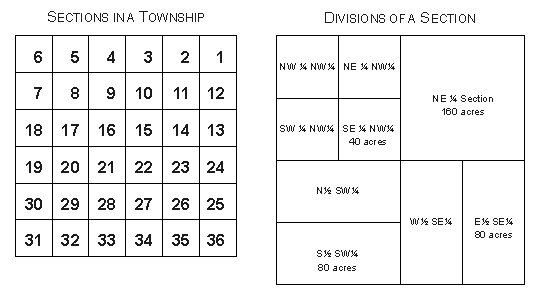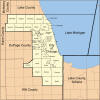Advice
Research How-To
As a part of their Genealogical Research Series, the Illinois State Archives offers an excellent pamphlet, Land Sale Records, to help you find your ancestors through land transactions.
Land Patents
The original sale of land by the federal government is recorded in a land patent. This could be a available aid to locating your early settler ancestors. You might find a land patent for an ancestor by searching at The Bureau of Land Management. The site also allows you to view an image of the document, which will tell you where (county and state) the purchaser lived at the time of the purchase.
Locating Land
A good explanation of the system for mapping township sections is offered in the "Determining Location" topic located near the bottom of the Illinois State Archives Illinois Public Domain Land Tract Sales webpage, some of which was captured and displayed below.
Townships


Maps courtesy of the Illinois State Archives
Typically, townships are divided into 36 sections of 640
acres. Each section is further subdivided into quarter sections,
half-quarter sections, or quarter-quarter sections. Examples of
these subdivisions within a township appear below.
NW – The northwest ¼ of a section (160 acres)
S2NW – South ½ of the northwest ¼ of a section (80 acres)
NENW – The northeast ¼ of the northwest ¼ of a section (40
acres)
Tracing the Ownership of Your Ancestor's Home
Many genealogists have an interest in the homes their
ancestors lived in. An abstract is a summary or list of all the
recorded documents pertaining to a particular property,
including transfers of ownership and mortgages on the property.
Abstracts usually begin with the original Government survey of
the land in the early 1800s, here in the Midwest, and have the
original Land Grant or sale of the property. They progress
through subsequent sales and divisions of the original plat,
down to the lot where your ancestors home was 1st built.
Abstracts can be quite lengthy, and wonderfully historical or
dull reading, depending on your point of view.
You can get an abstract (history) of ownership of your
ancestor's property for any time span you wish. With some time,
luck, resourcefulness and hopefully only a little money, you can
trace the ownership of your ancestor' s property no matter where
you are.
To trace the ownership of property in Cook County, you will need
to know one or more of the following -
1. the address of the property
2. the property number or PIN
3. the legal description of the property
1. You must have the address of the property to begin. If you
do not know the address where your ancestor's lived, you will
need to obtain it from census records, city or telephone
directories, or other sources.
2. To obtain the property or PIN number go to the Cook Co.
Assessor's search site as shown on the RESOURCE page of this
Cook County ILGenWeb (check the GOVERNMENT category and/or the
LAND and/or PROPERTY categories).
You will notice that the search asks for a range of numbers for
the address. Type in the same address number in both boxes.
Besides the PIN number, you will get the class code of the
property and assessed valuation.
If the class code tells you the property is not residential, or
the property does not appear on the search, you may have to
contact the Assessor's Office. Your ancestor's home could be the
site of an expressway, factory, shopping mall or the like. If
this is the case, you can still trace the ownership, but you
will have to search the title at the Recorder's Office or
through a title company.
Cook County Assessor's Office
118 N. Clark St.
Chicago, IL 60602
Phone 312-603-7550
3. Once you have the property address and PIN number, you can get the legal description, if you need it, by contacting the
Cook County Treasurer's Office
118 N. Clark St.
Chicago, IL 60602
Phone 312-443-5100
A legal description will read something like - W ½ of Lot 5,
Block 4, of the XYZ Addition to the ABC City Plat, Section 21,
Township 42 N, Range 13 E, of the 3rd P.M.
+ Contact the Current Owner -
The first place to try and get information on the history of
your ancestor's home is to try and get it from the current
owner. Assuming you do not live in the Chicago area and have no
one to go knock on the door, go to your favorite internet search
engine and look for "reverse directories" where you can type in
the address. This is my favorite -
http://in132.infospace.com/_1_469328__info/reverse.htm
If you get the current owner's name, but not his phone number,
go back to your favorite internet search engine and look for
"telephone search" or "internet white pages". You can call or
write the current owners. You decide. Maybe they have an
abstract they would share or copy for you, if YOU PAY THE COSTS.
At the least try and get the former owner's name and about when
they bought the home.
Even if you cannot get the name and phone number of the current
owner, you can still write them. Tell them who you are and what
you are doing, and ask if they can help. Include a SASE or tell
them they can call you COLLECT. Yes, you will be writing to
RESIDENT @, but put a short clever HANDWRITTEN message on the
envelope to get them to at least open it and read your letter.
+
Cook County Recorder of Deeds -
If you don't have any luck with the current owner, you have 2
more options.
Cook County Recorder of Deeds
118 N. Clark St.
Chicago, IL
60602
Phone 312-603-5050
This office keeps all records of transfer of ownership or sales
of property in Cook County as well as related documents such as
mortgages, liens, easements and disputes. They have all the
original documents there, either in bound volumes or on
microfilm, and you can get copies of anything. HOWEVER, they DO
NOT do lookups or research. SOMEONE must go there in person.
Don't panic yet.
They have a number of searchable indexes, either in bound
volumes or on computer, that a good genealogical researcher can
easily navigate. They have staff on hand to assist and advise
people on how to research the records and use the indexes.
There are Grantor (the person who sells the property) Indexes
and Grantee (the person who buys the property) Indexes. Here,
you need only the name and approximate year to begin the search.
However, this search can be quite time consuming for a common
name.
There is a Property Search Index in which you can search for
property records by the PIN number or name of sub-division
tract. Finally, there is the Retrieval Tract Book Index which
lists all documents for property between 1871-1985 based on the
legal description of the property.
So, you're not in the Chicago area and don't know anyone there
who will help you. Hire a genealogical researcher to do it for
you. That's what I did. I hired a researcher for $15.00/hr. and
it took her 3 hours to get the information and document copies I
needed.
Genealogical researchers are listed on the Cook Co. IL GenWeb
page, on Rootsweb classifieds, and on Cyndi's List. Use your
favorite search engine. Contact Chicago area genealogical
libraries and associations. They will have or know of private
researchers. Use your PC, telephone and snail mail.
+
Title Company Search -
If you have a lot of money or can't find a researcher or have no
time, a Title Company will have the entire history of your
ancestor's home, or any part of it you want, ready to sell you.
Use your favorite internet search engine to find a Yellow Pages
Directory for Chicago, and look up Title Companies. I used Yahoo
Yellow Pages and came up with over 100 title companies.
I used Chicago Title & Trust Co. You will want what they call a
Tract Search. Call 1-800-621-1919. Punch in ext. 5981 and ask
for Norbert Tyrus. Have the Cook County address of the property
and PIN number from the Assessor's search site. Tell him what
you want and for what period of time, and he'll quote you a
price over the phone.
I asked to have all Deeds of Conveyance (sales) and Mortgages
from 1898-1930 for my ancestor's Cook County home. The cost -
$300.00. That's what prompted me to look for a researcher. I
wound up paying $45.00 for 3 hours of research and received
information and copies of documents for 3 different properties.
Contributed Nov 1999 by Ron Flynn




